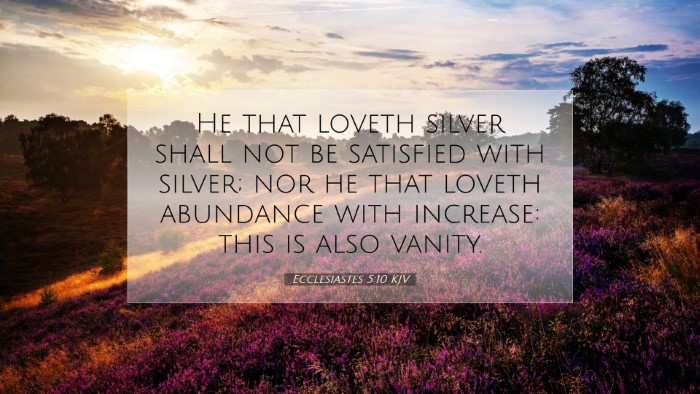Commentary on Ecclesiastes 5:10
Ecclesiastes 5:10 states: "He who loves silver will not be satisfied with silver; nor he who loves abundance, with increase. This also is vanity." This verse encapsulates a profound truth about the limits of material wealth and the human desire for more. Below is a synthesis of insights from various public domain commentaries that delve into the meaning and implications of this verse.
Insights from Matthew Henry
Matthew Henry suggests that the pursuit of wealth often leads to dissatisfaction. He emphasizes that the love of money is insatiable, and that those who are enamored with riches find themselves perpetually unfulfilled. Wealth, instead of providing happiness, brings frustration. The spiritual emptiness that accompanies this pursuit is likened to vanity—a chasing after the wind.
- Silver and Abundance: Henry notes that the desire for both silver and an abundance of possessions cannot satiate the soul's deeper needs. The more one acquires, the more one desires, leading to a never-ending cycle of longing.
- Practical Implications: He warns that this insatiable love for wealth can lead to various detrimental effects, such as greed, anxiety, and even corruption.
Insights from Albert Barnes
Albert Barnes adds another layer of understanding by contextualizing the verse within the broader themes of Ecclesiastes. He points out that Solomon, traditionally considered the author, experienced both the pleasures of wealth and the ultimate insight that they do not fulfill human longing.
- Caution against Materialism: Barnes emphasizes the folly of materialism. He asserts that true contentment does not come from possessions but from a right relationship with God.
- Vanity Defined: Barnes interprets "vanity" as the frustration of seeking fulfillment in earthly treasures, which ultimately leave the soul empty.
Insights from Adam Clarke
Adam Clarke offers a more applied perspective on Ecclesiastes 5:10. He reflects on the societal implications of wealth accumulation and how it often leads to moral compromise.
- Satisfaction Dilemma: Clarke states that people who pursue silver and wealth often find themselves at a loss, realizing that happiness is not found in material gain but in peace of mind and spiritual fulfillment.
- Societal Reflections: He also makes a broader societal observation, noting that societies driven by greed often suffer from moral decay and a lack of genuine community.
Theological Reflections
This verse serves as a timely warning for pastors and theologians. It encourages a theological examination of love, desire, and fulfillment. The insights from these commentaries guide leaders in fostering a deeper spiritual understanding among congregants regarding the nature of wealth and materialism.
- Spiritual Wealth vs. Material Wealth: The contrast between spiritual and earthly wealth highlights the necessity for believers to prioritize their relationship with God above all else.
- Encouragement for Contentment: The exhortation to find contentment in God rather than in material possessions resonates with the New Testament teachings, particularly in Philippians 4:11-13.
Conclusion
Ecclesiastes 5:10 and its exploration through the eyes of Matthew Henry, Albert Barnes, and Adam Clarke illuminate the path of wisdom regarding wealth. They remind us that the pursuit of riches can often lead to spiritual poverty, vanity, and dissatisfaction. As we engage with this text, we are called to reflect on our own values and priorities, understanding that true fulfillment lies not in the accumulation of wealth but in embracing the richness of a life lived in accordance with God’s will.


